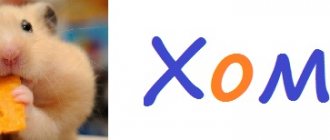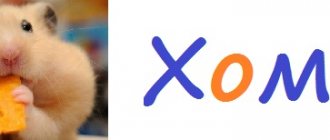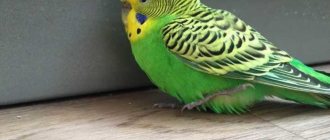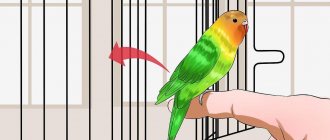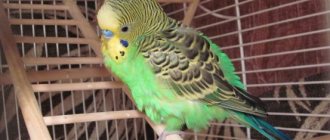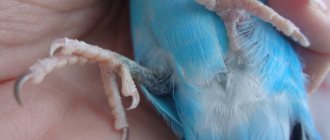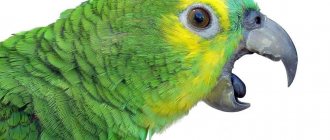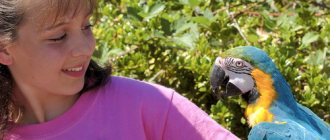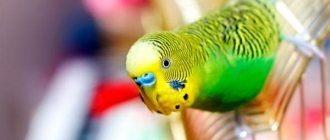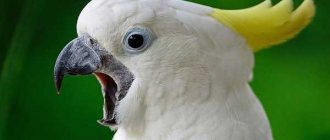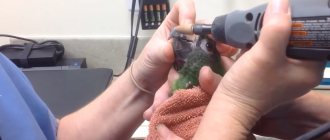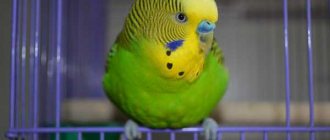The main reasons for the presence of grain in a parrot's droppings
Among the reasons why a parrot has undigested grain in its droppings are the following factors:
- Poor quality water. If the water in the drinking bowl has not been replaced for a long time, then pathogenic microorganisms begin to appear in it, which cause upset in the parrot’s digestive function. After bacteria enter the stomach cavity, the food taken - grains - ceases to be digested and is excreted in its original form with feces. Often a bird suffers with liquid droppings that contain whole grains;
- Dysbacteriosis. If a parrot poops grain, the reason may be a violation of the intestinal microflora. Among the accompanying symptoms are diarrhea, deterioration of general condition, lethargy, and indifference to the environment. The bird loses strength and cannot maintain the neatness of its plumage; as a result, it takes on a wet appearance. The cesspool is constantly dirty. Complex treatment is required to establish microflora in the intestines. First, the pathogens that cause the disease are destroyed using antibiotics. Probiotics are then taken to restore beneficial flora to the cavity;
- Indiscriminate and excessive consumption of antibiotics. It happens when the owner begins to treat the bird for various diseases without control and prescriptions from a veterinarian. As a result, the digestive function is completely disrupted, dysbiosis begins, and the parrot does not digest grains;
- Candidiasis. An infectious disease caused by the Candida fungus. The pathogen is present in the bird's digestive system, but only in small concentrations. As a result of exposure to negative factors, the number of fungi increases, and digestive dysfunction is observed. The reasons for the increase in numbers are the weakened immunity of the bird. The risk of disease increases if the pet has not eaten enough or received an unbalanced diet for a long time, received a large amount of antibiotics, or was kept in unsanitary conditions. The lack of vitamins in a parrot's diet also contributes to an increase in the number of fungi and the presence of other infectious diseases in the body. Special treatment with antifungal drugs is required.
Associated symptoms
Associated symptoms include the following:
- the bird’s digestive system is not able to fully digest the food, resulting in the presence of whole grains in the pet’s droppings;
- liquid droppings;
- there is general weakness of the body;
- a parrot can sit on a perch for a long time, ruffled;
- the bird does not react to its surroundings;
- the plumage becomes unkempt;
- loses appetite, which in turn leads to weight loss;
- Vomiting may occur.
Budgerigar spits and spits out food
From: Nikolay
> Tel.: +7 902 13*******
Message: Hello! Please tell me about the question. I have two budgies. Three days ago I noticed the second (blue) one was in poor condition. He got ruffled. Almost always asleep. Sometimes he drinks and eats a little. But he noticed that he was eating food through force. After eating, he seems to spit it out almost immediately when he returns to the perch, as if vomiting. Diarrhea with water. The parrot itself is lethargic and closes its eyes. I'm sorry that due to the recent heating shutdown, the room was cool, because... The temperature outside was very cool and the drop was sharp. The food has been eaten for a long time, the water is changing. There is a cockatiel mineral stone in the cage. Suspicion of goiter inflammation. Tell me what could be and what can be done. I am writing to you from the Murmansk region. We don't have any veterinarians for googai. Thank you in advance.
Read also: Why do your toes cramp?
Why does a parrot have a certain color of droppings?
Changes in the color of stool can be caused by feeding different colored foods, such as beets. If you are sure that this is the reason for the unnatural color of the stool, there is nothing to worry about. However, abnormal color of droppings may also indicate some diseases or pathologies.
Green
Liquid discharge of a green color, in the absence of feces, is a sign that the food has not been digested in the stomach. After entering the gastrointestinal tract, food must be completely digested, and its waste must come out with feces. If nothing came of it, then the stomach was empty.
This is very bad, since it is enough for a parrot to starve for 24 hours for irreversible damage to occur in its body. You need to take your pet to a veterinarian for examination, and before that, feed it generously with porridge; in such a situation, oatmeal is well suited.
Yellow
Yellow or yellow-green color of stool indicates problems with the liver or the presence of helminths. Sprinkle the food with 1/2 of the crushed Karsil tablet, you can add 1/2 of the Linex capsule to the wet food. If using pre-mixed grains, switch to Fiory or Prestige.
Black
Black stools indicate bleeding in the gastrointestinal tract. Another possible reason is parasites. To stop internal bleeding, the following treatment is prescribed: mix 1 drop of Dition with 4 drops of water. Give 1 drop of the resulting solution once a day for 1–3 days.
Black droppings on a budgie
If your budgie has black droppings, it means there is bleeding in its gastrointestinal tract. It is necessary to take emergency treatment measures .
It is recommended to buy “Ditsinon” (in ampoules). It is sold in regular pharmacies. The method of application is as follows: mix the solution at the rate of one drop of the substance per 4 drops of water and drip the mixture that you got into your parrot. The bird may choke, so to prevent this from happening, drip the medicine from the side. The maximum number of days of using this drug is three days. It is recommended to use it for one or two days, since increased blood clotting is also not good.
For mild bleeding, give twice a day one drop of the medicine "Vikasol", or nettle tea (Sold in any pharmacy. It is brewed according to the attached instructions, diluted in a ratio of one to one and then given to the feathered friend.), or a weak tincture of plantain leaves.
Treatment methods
The main methods of treatment are determined with an accurately established diagnosis. With the help of a professional ornithologist, tests are taken from the parrot in a laboratory. The droppings are examined and a swab is taken from the oral cavity. If necessary, a blood test is taken. After the cause of the disease is fully identified, the doctor prescribes a course of effective treatment, which is included in
taking various types of antibiotics, probiotics, and specialized nutrition. Only purified, high-quality water is used. The pet is kept in proper sanitary conditions.
If candidiasis is diagnosed, then antifungal drugs are used in the treatment of the bird. If the digestive system is upset, avoid eating fruits and vegetables and various juicy greens. At home, use a weak solution of chamomile as a drink, or rice water. Drugs such as Lactobifadol are used, which contain beneficial bacteria that restore the functioning of the gastrointestinal tract, normalizing the microflora. Activated carbon is added to the grain feed, which was sprinkled with a little water in advance so that the tablet particles stick to the feed. If the owner has visually determined that the bird does not consume dry activated carbon, then a solution is prepared and injected into the parrot’s beak through a pipette. The frequency of administration and dosage is determined depending on the disease in each bird individually. Enterosgel has a good effect. You should also follow the rules of sanitary keeping of a sick individual separately from healthy ones, and keep new birds in quarantine for at least a month. Such methods will eliminate possible diseases in healthy parrots.
Timely assistance will allow the pet to quickly restore digestive function and regain strength for an active life.
Home, leisure, hobbies
cockatiel. help save
2 weeks ago I brought a bird (24 hours on the road). Corella, male 4 months! Absolutely healthy, clean, normal litter. When I got home I didn’t eat for 3 days! then he started eating food, WAKA. He doesn’t eat anything else except food! refuses! a little over a week ago, I started seeing whole grains of food (slightly colored green) instead of droppings. I consulted on one of the Internet forums, where they suggested that I squirt baby milk-free porridge from a syringe! and Mezima 14 2-3 times a day... today I caught a parrot, he was screaming like crazy in fear... I gave 10 ml of liquid porridge... he was all smeared with it, trembling... I'm stupid, I decided to wash him with a spray bottle! and put it under the lamp! dried up, now all the feathers are in clumps, he sits trembling, emaciated! there is redness at the base of the beak and on the bridge of the nose! On the breast, as it turned out, there were no feathers at all; it was closed when it was clean! In general, I’m shocked at what I’ve done... how can I not lose him? Help.
Why does a parrot eat its own droppings?
Veterinarians say that eating their own feces is typical of young birds, but as they age, they stop doing this. Perhaps the reason is a lack of solid matter in the stomach. Birds need it for normal digestion. Try to introduce more solid food into your diet, as well as small pebbles and shell rock.
Another possible reason is a deficiency of vitamin B 12. This vitamin is produced in the stomach of the bird. In its natural habitat, a parrot eats the droppings of other birds, this allows bacteria to enter the stomach and start the vitamin production mechanism. A bird living in a house is forced to eat its own excrement to normalize the functioning of the gastrointestinal tract.
More often than not, this does not help the bird, since the bird’s body does not have enough vitamins, and the droppings will be corresponding. Dysbacteriosis can also cause this phenomenon. The bird acts exactly as it would do in natural conditions. If eating your own droppings occurs occasionally, there is nothing to worry about. If the bird does this constantly, it should be shown to a specialist.
It should be understood that it is wrong to draw independent conclusions about the state of health of a bird solely based on the appearance of its droppings. If your parrot's stool looks unnatural, this should alert you and prompt you to visit an ornithologist. Only a professional, perhaps with the help of tests, can determine the cause of the deviations and make an accurate diagnosis. And only on the basis of such a diagnosis is treatment prescribed.
Video: what to do if a parrot eats its own droppings
About the causes of the problem
This phenomenon in the language of veterinarians is called coprophagia. There may be several reasons that force a feathered pet to eat its droppings:
- Entertainment, tomfoolery. Young individuals eat their droppings simply because they thus show curiosity, play, and attract attention to themselves. The older the feathered pet is, the less often this factor is triggered.
- The absence of chalk stone or calcium deficiency in the body as a sign of dysbiosis - this phenomenon is also typical for birds. In this case, nature will help correct the situation. You need to break branches of apple, cherry, cherry, plum (fruit trees) and attach them to the parrot’s cage, after scalding them with boiling water, so that he will always be able to peck them. But in this case, you need to be careful and not use sprayed branches to feed the bird. Also, if there is a deficiency of calcium in the body of birds, it is recommended to include cottage cheese, oats, and nuts in their diet.
- Lack of cyanocobalamin (vitamin B12). This substance is not found in plant foods; it is formed in the pet’s intestines as a result of the work of microorganisms. Coprophagy in birds is a common way of replenishing cyanocobalamin deficiency in the body. Indeed, without this substance, the bird may develop problems with the skin and stomach. And to help the bird compensate for the lack of vitamin B12, you need to feed it yeast or special food.
- Lack of solid food. Sometimes coprophagia in parrots is explained by the fact that they do not have enough solid food to grind grain cereals in their stomach. It plays the role of a kind of grater in the gastrointestinal tract. If there are no small stones in its entrance, then the pet is forced to eat solid particles of its feces. To eliminate this cause of coprophagia, the owner must place a pot of sand in the parrot's enclosure. The grains of sand should be medium: not small, but not very large.
About other oddities in bird behavior
In addition to eating their own feces, inexperienced owners of birds may encounter other features of their behavior.
Often the bird can be found standing on one leg. A parrot is not a heron, and such a pose, it would seem, should not be characteristic of it. However, it happens. This may mean injury to a limb, freezing of the bird, or the presence of diseases of the digestive system. In such cases, it is necessary, first of all, to carefully examine the limb. If you do not find any injuries or damage, then you should seek help from a specialist ornithologist.
Another oddity that inexperienced bird owners may encounter is a bird plucking its own feathers. There are several explanations for this. The first is mites, which cause severe itching, skin irritation and a desire to alleviate your condition. The best option to correct the situation and help your pet is to use aversectin ointment. It is safe, effective and inexpensive. Acts on adult ticks and their eggs.
In addition to mites, severe stress can also cause feather plucking in a bird. A parrot may be frightened by the vigorous activity of guests in the house, the loud noise of household appliances, or the cat’s attempts to get it.
Another strange pose is the puffing and fluffing of the feathered bird. It's not always dangerous. This way he can spread out his feathers to cool down a little if the room is hot. Having cooled, the bird again takes on its normal appearance. The situation is worse if the flying pet is constantly sulky, refuses to eat and sleeps all the time - most likely the parrot is sick. The cause of the disease may be a common cold or coccidosis. A good ornithologist will be able to differentiate diseases and accurately diagnose a feathered pet. You should contact him for medical help and advice regarding oddities in the behavior of parrots.
Methods of control and prevention
Everyone knows that it is much easier to prevent a problem from occurring than to solve it later. And if you can turn a blind eye to eating litter for a while, then eating offspring cannot but upset you. However, if the parrot continues to eat droppings for a long time, measures need to be taken, because we already know that this can cause some deviations from the norm.
So, in cases where parrots eat their own waste products, you should immediately make sure that the bird has enough calcium. There should always be chalk and sepia in the cage; in addition, it would not be amiss to wrap the rods with cherry or apple tree branches, after dousing them with boiling water. Alternatively, branches can be laid on the bottom of the cage. It is also worth regularly offering your parrot to eat grain, it helps improve digestion. Thus, it is possible to prevent the development of dysbiosis in poultry.
To prevent a lack of vitamin B12, the lack of which causes birds to peck droppings, you can add yeast in special preparations or animal products to the diet. To help with your pet's digestion process, you can place a small, medium-sized container of sand in the cage. If such measures do not help, and the parrot continues to eat its droppings, you should contact an ornithologist who will help you deal with the problem.
In cases where the female eats the eggs, things are a little more complicated, because most often the reason lies in the emotional state. First of all, it is worth reducing the frequency of mating to two times in a row, and then taking a six-month break. Thus, a rested female is more likely to hatch offspring.
A female parrot who is busy hatching eggs should be protected from any stress. After all, a parrot is a timid bird, and nervous shock can lead to it eating its offspring. If a female pecks at the offspring several times in a row for no apparent reason, it is worth excluding her from breeding.
There can be many reasons for what a person thinks is inappropriate behavior in a parrot. Some of them are simply indiscriminate in their food; these include budgerigars, which are considered the most common. In any case, if the bird’s behavior seems unnatural, and there are no visible reasons for this, you should not risk the life and health of your pet. You need to show it to an ornithologist who can accurately determine the cause and eliminate it.
If the owner is completely unfamiliar with the habits of birds and has never kept them in the house, then he will be horrified by the fact that a parrot in a cage eats its own feces. At the same time, he is provided with good nutrition, feeding is present, and the bird is not deprived of attention. What's the matter then? Why does this happen? Let's find out in detail.
